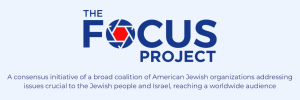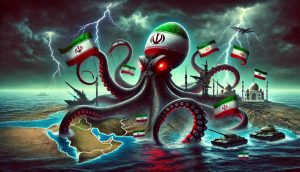Issue: May 13, 2025

STAY INFORMED – TALKING POINTS – ACTIONS TO CONSIDER – STORIES MAKING NEWS
![]()

Hamas hostage Edan Alexander, an American-Israeli – held in Gaza for 584 days, was just released to Israel and welcomed by his family in a deal brokered between the Trump Administration and Hamas – without Israel’s known participation. Alexander was the only living dual American-Israeli citizen still in Gaza – where dozens of other hostages remain, about 20 presumed alive.
President Trump’s trip for meetings in the Middle East, without a stop in Israel, took many by surprise. The Saudis lavishly greeted the president upon his arrival, amid reports that a normalization agreement between Saudi Arabia and Israel has been separated from a nuclear energy cooperation deal between the Saudis and Americans. Trump’s meeting with the Saudi ruler has been reported to include leaders of the Palestinian Authority, Syria and Lebanon.
These discussions and others raise significant questions among Israelis and their supporters about policy changes in the U.S.-Israel relationship. The president also accepted the gift of a Qatari luxury jumbo jet to temporarily serve as Air Force One, a move criticized by Sen. Rick Scott: “I’m not flying on a Qatari plane. They support Hamas.”
Amid the region’s constant storm of uncertainty, the enduring alliance between America and Israel is a critical anchor – a partnership forged over decades of shared values and strategic interests. This firm bond has withstood political leadership changes and evolving regional realities, providing an important foundation for navigating new challenges.

Historic Partnership: ‘Shared kinship, traditions and values’
The U.S.-Israel relationship is rooted in shared democratic ideals, deep cultural connections and a mutual commitment to security. America and Israel hold joint military training exercises involving thousands of troops, numerous state and local trade delegations visit Israel to increase exports and U.S. tech giants – including Intel, Google and Microsoft – benefit from significant investments in Israeli research and development.
The alliance has traditionally transcended political cycles and been recognized as strategically vital by Democrats and Republicans. U.S. Rep. Ritchie Torres: “The U.S.-Israel relationship is an unbreakable bond whose durability will stand the test of time.” Former Sec. of State Condoleezza Rice: “Israel is a country with whom we have so many ties of kinship, of tradition and of values.”
Gaza: Hope Amid Hostage Crisis
The release of American-Israeli hostage Alexander brought a glimmer of hope in the struggle for the return of the remaining hostages. Iran-backed Hamas presented his release as a goodwill gesture towards President Trump without conditions for America and Israel. Hamas refuses to relinquish its control – even though an increasing number of vocal Gazans want it removed from power – and Israel vows to continue its security operations until all hostages are released and Hamas disarmed. Dozens of friends and supporters of the Alexander family rallied in Tenafly, NJ, to celebrate his release. Trump has called for the release of all the hostages, an end to the war and increased humanitarian aid deliveries.

The Houthis: Limited Truce, Persistent Threats
A recently brokered ceasefire between the U.S. and Iran-backed Houthi rebels in Yemen focused on halting attacks on American ships traveling in the Red Sea. Israel was left out of the agreement, which was reached only a day after the Houthis struck Ben Gurion International Airport with a ballistic missile. America recently pounded Houthi targets in airstrikes aimed at degrading their ability to attack this key international shipping route. The terror group has explicitly stated that its hostility towards Israel remains unchanged and it is still attacking Israel. A bipartisan group of U.S. representatives “expressed serious concern that the agreement leaves Israel dangerously vulnerable and fails to confront the broader threat posed by Iran’s proxy network.”
Syria: Trump May Provide a ‘Fresh start’
The recent toppling of Iran-backed Syrian dictator Bashar al-Assad and the rise of a new government have prompted a reassessment of U.S. policies. President Trump stated he is considering lifting sanctions on Syria to support the new leadership and provide the country with a “fresh start” – remarks welcomed by Syria’s new leaders. The government is led by an Islamist paramilitary group that was formerly affiliated with al-Qaeda – the perpetrators of the 9/11 attacks. The U.S. Treasury Dept. already eased some sanctions to facilitate essential services. However, comprehensive sanctions against Syria remain in effect because of human rights abuses and its support for terrorism.
Amid the shifting political landscape, Israel has been supporting the Syrian Druze community. The Syrian government is persecuting and attacking this small religious minority – more than 120 civilians were killed in one recent attack. A Druze woman: “We fled from our home because I feared for my baby. We are receiving humanitarian aid from Israel. It’s heartwarming to see such compassion and unity.” About 150,000 Druze live in Israel – many have become decorated military heroes and served in Israel’s parliament. The Israeli Defense Forces recently flew in supplies and set up a medical facility in southern Syria to treat victims.

Iran: Persistent Regional Threat and Nuclear Ambitions
Iran’s nuclear weapons program is a dangerous threat for a regime that routinely calls for the annihilation of Big Satan and Little Satan – America and Israel. Iran’s religious leaders provide funding, weapons and training for its proxy groups, including the Houthis, Hamas and Hezbollah. Iran constantly evades international inspections of its nuclear program. President Trump restored “maximum pressure” on Iran’s regime earlier this year to “deny Iran all paths to a nuclear weapon and counter its malign influence abroad.”
Now, Trump is indirectly negotiating with Iran – Oman is mediating – and stated that he is willing to meet with Iran’s supreme leader. While reports are swirling over whether or not Iran would have to dismantle parts of its nuclear program, Congressional Republicans are calling for “the complete dismantlement and destruction of Iran’s entire nuclear program.” Israelis – and American Jews who fled Iran because of the Islamic Revolution – are worried about the negotiations legitimizing the regime and allowing Iran to retain its nuclear program.
U.S.-Israel Alliance: ‘STRONG partnership’
Where all of this leads is unclear. Both the Trump and Netanyahu administrations stated that while there may be policy disagreements, there is no rift. Working to ease some of the concerns, U.S. Ambassador to Israel Mike Huckabee – a longtime supporter of Israel – continues to emphasize the enduring nature of the shared bond between America and Israel: “I say to people, ‘Relax, calm down, Donald Trump loves you, there’s no doubt about that, he’s got your back.’ Israel doesn’t have a better friend. The partnership is STRONG.”

![]()

![]()

Strengthening the U.S.-Israel Alliance
The continued bipartisan support of the U.S.-Israel alliance relies on active support:

May is Jewish American Heritage Month which celebrates Jewish contributions to America. May is also National Inventors Month.
This week’s JAHM focus is Science & Technology.
From astronauts to inventors and from chemists to cybersecurity experts, the impacts Jewish Americans have made on modern science and technology are revolutionary. The ability to change the TV channel with a remote control, push a shopping cart in a grocery store, pop an Aspirin for a headache and wear denim jeans all exist because of Jewish inventors. Inventions by Jewish scientists and innovators have changed the way our modern world functions by creating conveniences and time-saving breakthroughs that, at one time, we could only dream of – including the polio vaccine, the cardiac defibrillator and the USB flash drive.
A few of many Jewish American inventors, scientists and tech pioneers:
Want to learn more?
How do you JAHM? Whether it’s reading a book by your favorite Jewish American author, watching a classing Mel Brooks comedy, or cooking Molly Yeh’s latest recipe, we want to know how you JAHM! When you post, use the hashtags #MyJAHM and #OurSharedHeritage to connect to the national celebration.
Click here to access the JAHM toolkit full of resources, posters, social media graphics and more!

![]()
![]()

Stories Impacting American Jews
Stories Impacting the U.S. and Israel
Stories From Around the World
![]()
Did you miss a recent edition of The Focus Project? No need to search your inbox. Our most recently published editions are available on our website.
Want more? Click Below to access additional Focus Project resources:
![]()

This content is developed by The Focus Project in partnership with MERCAZ USA. The Focus Project distributes weekly news and talking points on timely issues concerning Israel and the Jewish people, including antisemitism, anti-Zionism and the delegitimization of Israel. It represents a consensus view across a spectrum of major American Jewish organizations. MERCAZ USA recognizes and respects the diversity of views on these issues among its readers and the community at large.
![]()